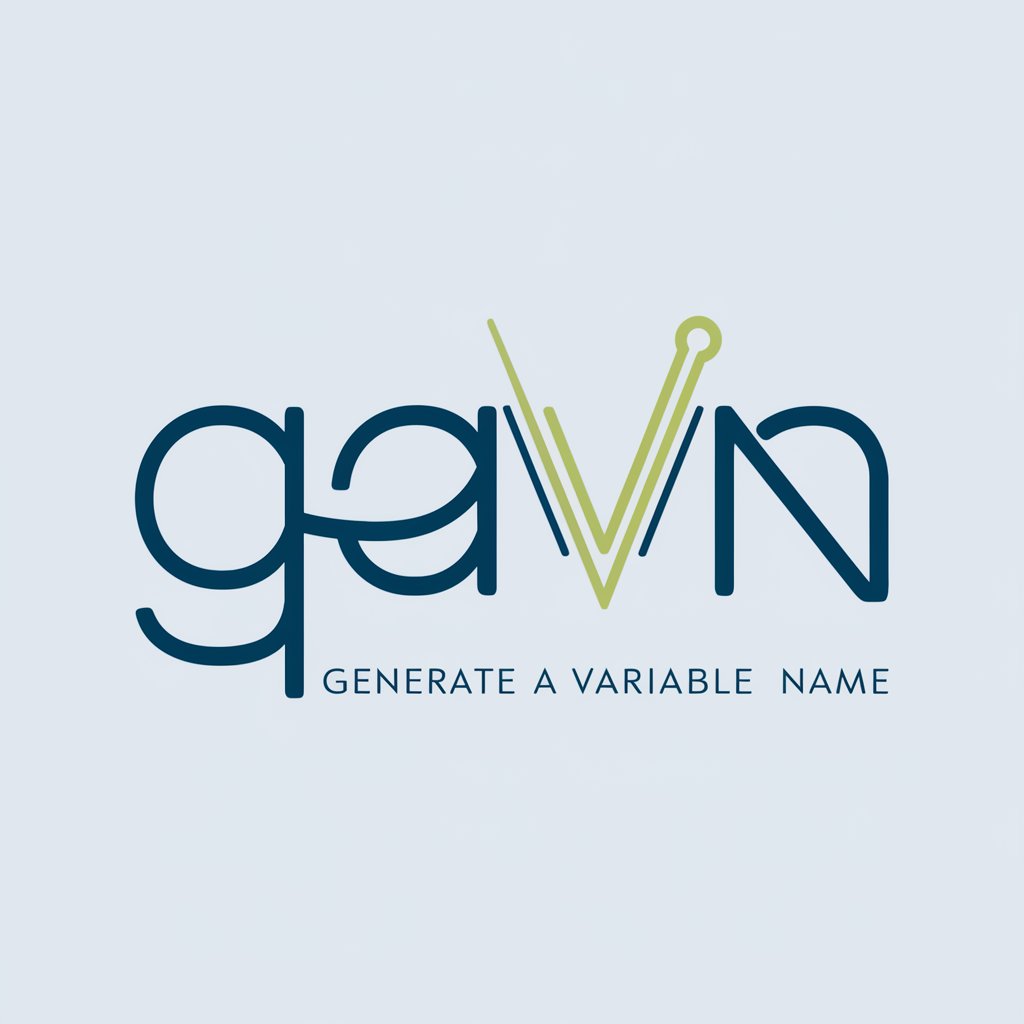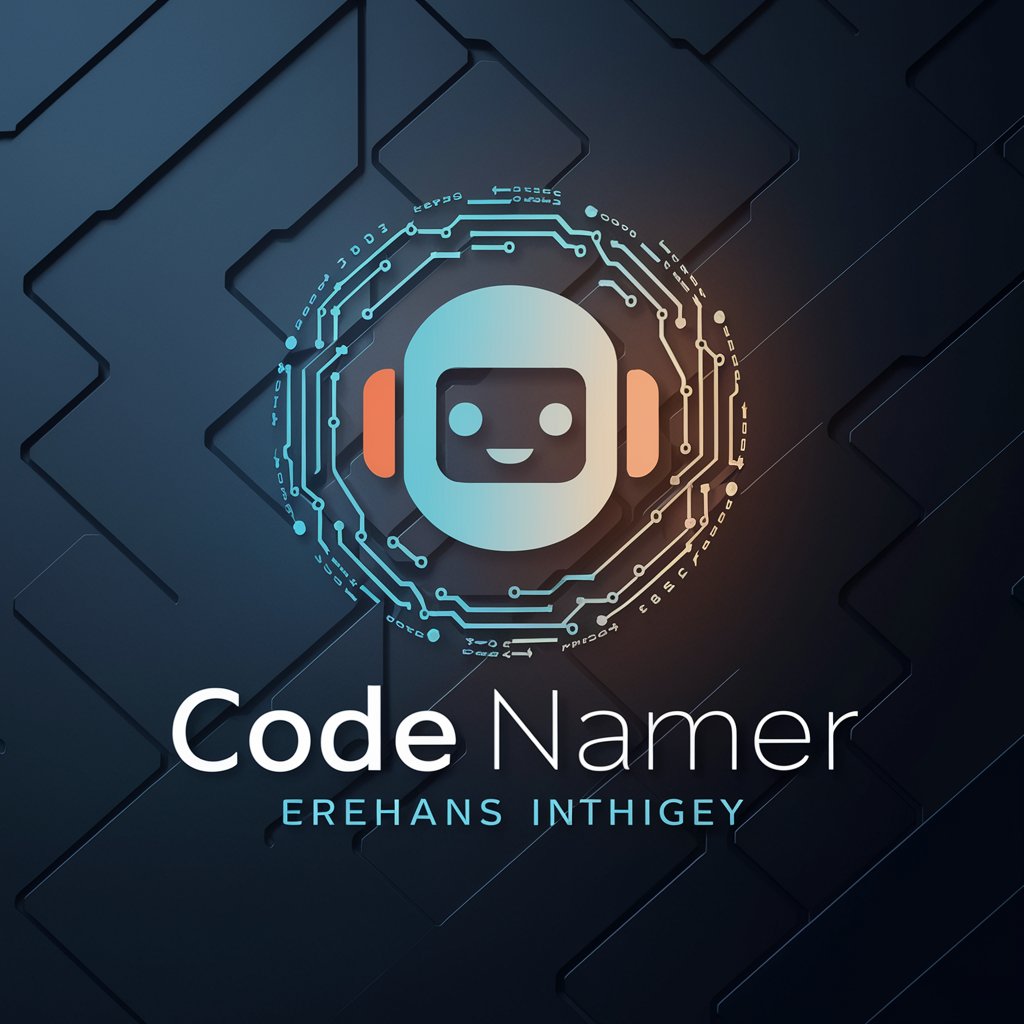
变量名创建者 - Variable Naming Tool

Hello! Ready to generate some perfect variable names?
Craft precise, AI-powered variable names effortlessly.
Generate a lowerCamelCase variable name for
Create an UpperCamelCase variable name to
Suggest a snake_case variable name for
Provide a constant variable name to
Get Embed Code
Introduction to Variable Name Creator
Variable Name Creator, or 变量名创建者, is a specialized AI tool designed to assist in generating concise and meaningful variable names for programming and coding projects. Its primary purpose is to streamline the coding process by offering quick, relevant variable name suggestions based on user inputs. The default naming convention used is lowerCamelCase, although it can easily switch between other conventions like UpperCamelCase or snake_case upon request. This flexibility allows it to cater to various coding standards and preferences. For example, given the input 'user login count', it might suggest 'userLoginCount' in its default format, or 'UserLoginCount' and 'user_login_count' for UpperCamelCase and snake_case respectively. Powered by ChatGPT-4o。

Main Functions of Variable Name Creator
Generating variable names in different naming conventions
Example
'userLoginCount' (default), 'UserLoginCount' (UpperCamelCase), 'user_login_count' (snake_case)
Scenario
Useful in software development projects where consistency with a project's naming conventions is crucial for readability and maintainability.
Providing multiple naming suggestions
Example
'loginTime', 'loginTimestamp', 'userLoginTime'
Scenario
Helpful when developers are brainstorming names that accurately reflect the purpose of a variable, ensuring clarity and understanding within the code.
Adapting to specific programming languages or frameworks
Example
Given the requirement for constant naming, it might suggest 'LOGIN_COUNT' for a constant in a language like Java or C#.
Scenario
Assists in adhering to the idiomatic practices of different programming languages or frameworks, enhancing code quality and developer productivity.
Ideal Users of Variable Name Creator
Software Developers
Professionals and hobbyists who are involved in coding and software development. They benefit from streamlined naming processes, saving time and enhancing code readability.
Educators and Students
Instructors and learners in computer science or programming courses can use this tool to understand and apply best practices in variable naming, aiding in learning and teaching coding conventions.
Technical Writers
Writers documenting code or technical processes can use the tool to ensure that their documentation uses clear and consistent terminology, making technical content more accessible.

How to Use 变量名创建者
Step 1
Visit yeschat.ai to start using 变量名创建者 for free without the need to log in or subscribe to ChatGPT Plus.
Step 2
Choose your preferred naming convention (e.g., lowerCamelCase, UpperCamelCase, Snake_case) by specifying it in your query.
Step 3
Describe the purpose or context of the variable you need a name for, including any specific details that might influence the naming.
Step 4
Review the generated variable names and select the one that best fits your needs. The tool provides multiple options for each query.
Step 5
Utilize tips for an optimal experience, such as keeping queries concise and specific, to improve the relevance of generated names.
Try other advanced and practical GPTs
Bob The BuilderGPT
Empowering your DIY projects with AI

Fashion Guru
AI-powered Personal Stylist at Your Service

Travel Guide
AI-Powered Personal Travel Advisor

What to Watch
Discover your next favorite show, powered by AI

Guide de Bien-Être
Empowering your wellness journey with AI

嘿,贪吃蛇
Unleash Creativity with AI-Powered Art and Words

Fitness Coach
Your AI-powered fitness companion

GlobalNews Monitoring
Unlock Real-Time News From Everywhere, Powered by AI

What Can I Say?
Empowering conversations with Montessori wisdom

Deforum Director GPT
Animating Your Ideas with AI

GPT角色提示词生成器
Craft Your Character's Voice with AI

Interne Untersuchungen in der Schweiz
Navigating Internal Investigations with AI

Detailed Q&A about 变量名创建者
What is 变量名创建者?
变量名创建者 is an AI-powered tool designed to generate meaningful and concise variable names in various coding conventions based on user descriptions.
Can 变量名创建者 generate variable names in different programming languages?
Yes, while the naming conventions are universal, the generated names can be applied across different programming languages, depending on the syntax compatibility.
Is there a limit to the number of variable names I can generate?
No, you can generate as many variable names as you need, with each query providing multiple options to choose from.
How does 变量名创建者 ensure the generated variable names are meaningful?
The tool analyzes the context and specific details provided in your query to generate names that accurately represent the variable's purpose or content.
Can I specify custom naming conventions in 变量名创建者?
While the tool offers standard naming conventions like lowerCamelCase, UpperCamelCase, and Snake_case, it primarily focuses on these formats. Custom conventions might require manual adjustment.





